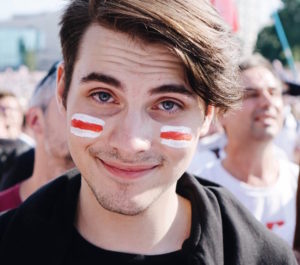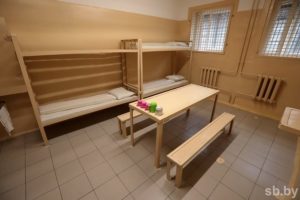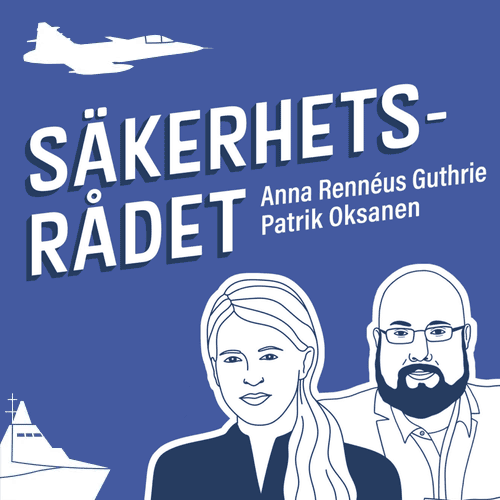This article is part of the Let The World Hear Project, which is a collaboration between Stockholm Free World Forum’s webzine Säkerhetsrådet and a number of Belarusian volunteers. Together we have gathered stories from victims of the dictatorship regime in 2020. The world must know what happened.
Read more about the project here.
This is the story of 22-year-old Pavel from Minsk. When the Belarusian authorities shut down the Internet in the entire country him and his friends went outside simply to understand what was going on. They were arrested immediately.

A protester (not Pavel) in Minsk. Photo: Artem Podrez/Pexels
On that day [the day of the arrest] my friends and I decided to go outside, out of curiosity, simply to see what was going on, as the Internet was shut down and we had no information at all. When we reached the Belarusbank building at Dzerzhinskogo Street, a yellow minibus appeared. OMON representatives jumped out of it and started running at us. I tried to escape to the right of the bank, but there was a fence so I had to go back. It was too late. They grabbed me and dragged into the vehicle. My glasses fell on the ground so I drew attention to them, but the officer cursed at me in return, saying, “I don’t give a fuck” (this was their favorite expression, by the way; they said it all the time) and hit me in the stomach. The glasses were left somewhere on the ground. They threw me on the floor of the bus, walked over me a couple of times while I was still lying on the floor and rudely asked for my phone.
They brought us to the Moskovsky district police department and dragged everyone out of the bus up to the assembly hall on the 3rd or 4th floor. While walking, the officers were holding our arms twisted upwards and commanded us to keep our faces down. It was hard to walk like that and I wasn’t very good at it, so they kicked and hit me in order to make me walk faster. We were told to lie down on the floor. A police officer approached each of us, asking where and why we had been detained. I told him that I had simply taken a walk outside. He asked me why I went outside today, as I should have stayed at home instead.
They made us sit on chairs while holding our handcuffed hands to the front of us. We had to make sure that our heads were kept as low as possible, otherwise we would be beaten. I don’t remember if I was beaten there, but I heard how they were striking hard down on those who were “misbehaving”.
We sat like this for quite a long time – until we were all registered and our data had been processed. Then they took us to the inspection department. There, they took all our personal belongings. A police officer tore my belt and took off my shoelaces. After that they took everyone to the first floor where we had to sit “on our knees, heads down, hands behind our heads, knees crossed” for another hour or so. This position is very uncomfortable, reminding me of the shape of a bridge. They were filming us in this position and probably taking photos as well. Luckily, one officer saw that I had started to shake and realized that I was unwell, so he took me to the toilet and allowed me to use it, as well as to wash my hands and face. When we returned, we were allowed to sit in a normal position. At this point, some people were taken to cells. They dragged the rest of us back to the assembly hall and we remained seated in chairs again, making sure that we kept our heads down.
All in all, we spent around 6 hours there waiting for the protocols, most probably from 3 a.m. to 9 a.m., though I cannot confirm since we didn’t have our watches. Around 9 a.m. they read out our charges. I heard that one guy was accused of holding a grenade. He had clearly been severely tortured, his body was covered in bruises. I was afraid that they would torture me like that, but they didn’t touch me. As I understood it, for a mere conduct of disorder, they issued administrative fines and immediately released people by making them sign agreements not to participate in the protests.
While people were being released and given their belongings, someone either stole or accidentally took the wrong phone – this seemed to knock down all their work, because they stopped reading the charges and were actively swearing. As a result, they changed their method of work: some people were given their personal belongings and protocols for signing, and some were simply taken to the cells. I guess it was around 11 a.m. or midday when a police officer took me as part of a group to a cell. An investigator asked the officer if he had familiarized us with the case materials. He replied that he had, but in fact I never even saw my charges. There were 15 of us in an airtight cell and we were given only one litre of water. Apparently this was their sense of humour, because in the neighbouring cell where there were eight people, they were given three litres.
We waited and thought that we would be taken immediately to court. But in the end, two hours later, avtozaks arrived and the officers threw us in. I was unlucky and forced to ride in an avtozak with cruel and ideological riot police officers who enjoyed making fun of people in brutal ways. They shoved about 27 people into the avtozak. On the way, they kept telling us that we will remember this for a long time and threatened that we would be severely beaten. They made sure that we sat in an uncomfortable position with our heads down and our hands behind our heads. Sometimes they would warn you before they beat you; sometimes they would beat you without a warning. There was a command to raise our head if we wanted to speak to someone. They made us sing the anthem of Belarus; those who sang poorly were beaten. It happened several times, they beat us alternately. They kept saying, “Well, now what? Did you get your changes?”.
After two hours, we arrived at Zhodzina. It was very uncomfortable remaining in this position for such a long time, because my legs got very numb. If you complained, they would beat you even more. Some of the group were allowed to change positions, but they disliked me and did not allow me anything, because they thought I was “too much of a greyhound”, in their words. In general, they enjoyed beating those who reacted. At one point I was able to change my position since the officer who was at the back of the avtozak wasn’t very observant, which made it possible to secretly change the position of my legs.
They severely beat a man with long hair as well as those who had any visible tattoos, and journalists – Russian journalists were detained among us. They kept asking for people’s salaries and when they heard the reply, they would say, “So what are you not happy about?” It was better to answer, because if you stayed silent, they would beat you even harder. They seemed to enjoy beating people with truncheons as well as kicking them.
They beat me when I requested something. There was a dialogue when they asked whom I voted for and I replied that, “I voted for Dmitriev”. He, in turn, replied that, “all your Dmitrievs and Tsikhanouskys want to sell everything and privatize the country”. I said, “Lukashenka also has privatization in the program”. He replied angrily, “We are not talking about politics right now, look what you did to the city.” This phrase, “look what you did to the city”, seemed to be their argument. One man said, “So what to do? Sit at home and do nothing?”, to which they replied, “Yes, you have to stay at home and not go out at all!”
Upon arrival, they laid us on the prison ground with our faces down and made us wait for the staff to come and give orders for distribution. Afterwards, we were transferred to a cell. There were about 20 people in a regular prison cell with stone walls. From that moment on, we were at least treated normally and not beaten. Prison staff even brought us water upon request. In this cell I spent the remaining two and a half days of my arrest.

A prison cell in Zhodino, Belarus.
People were taken in and out. The cell was constantly overcrowded. At most, there were 37 people in the cell, which was designed for five people. The biggest problem was to find a place to sleep. We laid out the mattresses on the floor, someone slept on a bench and someone on the table.
We were given food on a daily basis. There weren’t enough cups for everyone though. One person had a broken leg so they gave him an anesthetic pill. The group of people in the cell had all been accidentally caught, just like me, so there was no strict hierarchy in the cell. There was an atmosphere of solidarity and we supported each other as much as we could. But the absence of any information was very depressing because we were not allowed to request a phone call. They explained that we were being held until the “circumstances were clarified”. We were eventually released after 72 hours had passed, plus the additional 12 hours of delay. We weren’t charged and released on a written agreement not to participate in the protests.
HC: So you’re saying there was no court?
There was no court. The charges were drawn up in the police department and they never showed it to me. Some people saw their charges, but refused to sign them. We were released on the morning of Friday 14 August.
HC: Were you beaten in Zhodzina as they were releasing you?
No, they didn’t beat us at the moment of release. When we went to collect our stuff, everything was scattered and mixed: phones, money, watches… everything. I was lucky because my belongings were in my bag. But there were people who could not get anything back at all. We were met by volunteers and I am very grateful to them for that.
HC: How did you get home?
My parents met me. Apparently they had been waiting for me outside of the prison gates because my friends had contacted the local police department and were able to find out that I had been taken to Zhodzina.
HC: What lesson did you learn from this awful experience? Did you learn something new about yourself or about other people?
To be honest, not all officers were cruel, I’d rather say most of them were understanding. I was rather unlucky, because I was caught by brutal riot police officers. Well, again, I really liked the atmosphere of solidarity in the cell, because there were people with different opinions; there was even a person who had voted for Lukashenka and remained unconvinced. When imprisoned, I saw people united by a common problem and when I was released, I was amazed to see even more solidarity and positive social changes, and it was very encouraging.
In connection with these events, solidarity has become a trademark for the Belarusian society. People were outraged by the unprovoked violence. They gathered together, began to organize strikes and express their protest against the violence. I took photos of my bruises and I want to punish those who mocked me. When recording and registering the evidence of beatings, the doctor expressed their solidarity by shaking my hand. The investigator accepted my testimony. I know that the forensic experts worked even on weekends to be able to serve as many people as possible. It inspires me a lot and gives me hope that our civil society is developing.
HC: As far as I understand this was your first experience of detention. Do you think it will change anything? Do you feel your contribution and involvement?
Yes, it was my first experience of detention and I hope to never be detained in the future. Speaking about change, I think that society has changed in the sense that we are ready to rebuff this regime and it will no longer be the same as it was in previous elections. Our people have always been apolitical and did nothing to change things. As far as I know, in Hrodna [a city in Belarus] they’ve already managed to make the authorities release those who were imprisoned during protests, including the journalists. In Barysau and many other cities, the authorities had to publicly apologize as well as open cases against cruel officers. I think that we can really achieve something. People have stopped being afraid to file complaints and tell the truth. This is a truly new type of relationship between the society and law enforcement agencies, including the authorities and the state apparatus. The people have expressed their opinion and now the authorities have to deal with it.
The story was originally told in Russian to Hope C. and translated by Maryana Smith.
